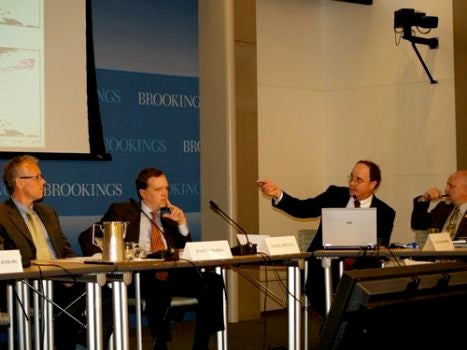A policy released today by the National Oceanic and Atmospheric Administration (NOAA) charts an historic new course for the nation’s fish stocks, giving hope for the recovery of struggling fishing communities and depleted fish resources. With the new policy, NOAA is seeking to correct decades of failed management that has resulted in economically-depressed, unsafe, and unsustainable fisheries around the country.
The policy promotes greater use of catch shares, and we at EDF applaud NOAA for promoting this innovative fisheries management approach proven to improve fishermen’s lives and livelihoods and restore fish populations. NOAA’s policy builds upon the significant work of fishermen, fishing communities, scientists, fishery managers, and conservationists to design and implement catch shares in fisheries around the country.
Catch shares work for fishermen and fish populations because they include science-based annual catch limits, accountability measures to ensure compliance with those limits, and effective enforcement. At the same time, catch shares give fishermen greater flexibility for how to run their businesses, which improves economic performance.
NOAA’s new policy does not mandate catch shares for fisheries but rather makes important changes in strategy and operations, providing incentives and support for fishery managers who pursue catch shares. In particular, the draft policy:
- Promotes the consideration and adoption, where appropriate, of catch share programs in federal fisheries.
- Removes technical and administrative impediments to catch shares.
- Provides technical and other support to those regional fishery management councils that choose to pursue catch shares.
- Enhances outreach, education and assistance to stakeholders.
- Promotes the development of technical guidance on specific program design elements.
- Supports adaptive management through new research and performance monitoring of catch share programs over time.
The policy has been released in draft form but will take effect immediately. NOAA will take public comments for the next 120 days.
Today, as NOAA announces their new policy, EDF introduces the Catch Shares Action Toolkit to provide a resource for supporters of catch shares and encourage them to take action by telling NOAA and others that catch shares fishery management is the right policy to protect and restore the public’s ocean fishery resources, and increase profitability, wages, and safety for fishermen.
The toolkit features videos of fishermen sharing their stories about the failures of the current management system and why they support catch shares programs. The toolkit also encourages catch share supporters to engage in the dialog about catch shares through commenting online to NOAA and news articles, spreading the word about the benefit of catch shares to their friends, and submitting their own stories.
Today over 50 federally-managed stocks are overfished or experiencing overfishing. Under current management, meeting a Congressionally-mandated deadline to end overfishing by 2011 will mean ever-shorter fishing seasons and long-term closures for many prized species which will have a devastating impact on coastal communities. Catch shares allow continued fishing even while fish stocks recover.
We encourage all catch share supporters and those who want to learn more about this solution for our struggling fisheries to visit our new Catch Shares Action Toolkit.












